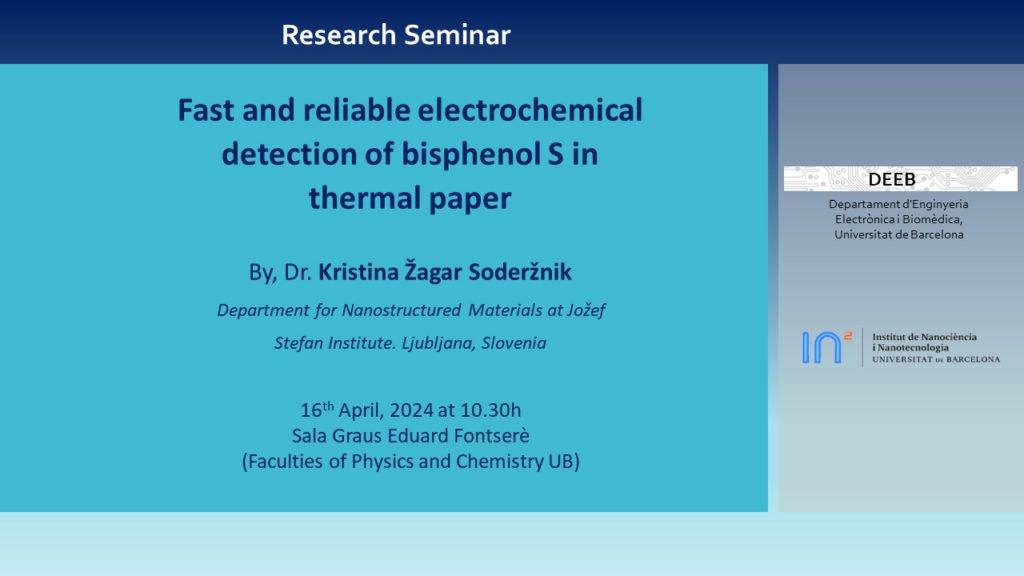Fast and reliable electrochemical detection of bisphenol S in thermal paper
By, Dr. Kristina Žagar Soderžnik. Department for Nanostructured Materials at Jožef Stefan Institute. Ljubljana, Slovenia
Date and Venue: 16th April, 2024 at 10.30h – Sala Graus Eduard Fontserè (Faculties of Physics and Chemistry UB)
(Chaired by Dr. Cristian Fàbrega, IN²UB and Faculty of Physics)
Abstract:
Bisphenol S (BPS) is one of the most common persistent and mobile chemicals found in everyday products such as thermal paper. BPS can easily enter the body by migrating from the paper to the fingers, where it disrupts the endocrine system by mimicking the estrogen hormone, so negatively influencing human health. Determining the levels of BPS in people’s lives is of great importance. Within the presentation, a strategy for the rapid and reliable measurement of BPS in thermal paper and tap water is proposed based on comparing two analytical methods: electrochemical sensors and liquid chromatography. Liquid chromatography-mass spectrometry (LCMS) triple quadrupole is a promising method for the determination of BPS in pM concentrations. On the other hand, electrochemical sensors enable an in-situ, real-time measurement. We present a simple, low-cost, electrochemical sensor for detecting BPS using screen-printed electrodes based on carbon (SPE-C) and single-wall, carbon-nanotube (SPE-SWCNT) working electrodes. BPS was detected over a wide linear range from 1 to 400 µM. The limits of detection were found to be 0.73 µM and 0.87 µM for the SPE-C and SPE-SWCNT electrodes, respectively. Good repeatability was observed for both sensors when using one electrode 16 times, which demonstrates its potential for real-time environmental monitoring.
About the Author:
Kristina Žagar Soderžnik is a research fellow at the Department for Nanostructured Materials at Jožef Stefan Institute. She obtained PhD degree in 2011, and in 2014, she was a postdoc at the Vienna University of Technology in Austria and at Ernst Ruska-Centre (ER-C) for Microscopy and Spectroscopy with Electrons in Jülich, Germany. Her main research expertise is the synthesis and characterization of metal oxide nanomaterials processed via template‐assisted electrophoretic deposition (EPD), electrochemical deposition (ED), electrochemical oxidation of nanoporous templates, and hydrothermal synthesis. Currently, she is involved in the research and development of portable, easy-to-use, selective, and highly sensitive electrochemical sensors for the detection of toxic organic compounds, biomolecules, and viruses. She is author or co-author of 39 SCI papers, 4 patents, 6 popular articles/interviews on science and supervisor to PhD and master students.
This event has received support from 2024 Call to Support Organization of Congresses and Invited Professors at the IN²UB.

